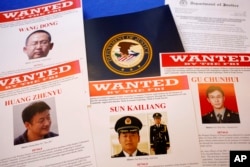The top Democrat on the Senate Intelligence Committee warns the United States is being outgunned in cyberspace, already having lost its competitive advantage to Russia while China is rapidly closing in.
"When it comes to cyber, misinformation and disinformation, Russia is already our peer and in the areas of misinformation or disinformation, I believe is ahead of us," Senator Mark Warner told an audience Friday in Washington.
"This is an effective methodology for Russia and it's also remarkably cheap," he added, calling for a realignment of U.S. defense spending.
Warner, calling Russia's election meddling both an intelligence failure and a "failure of imagination," strongly criticized the White House, key departments and fellow lawmakers for being too complacent in their responses.
As for China, Warner called Beijing's cyber and censorship infrastructure "the envy of authoritarian regimes around the world" and warned when it comes to artificial intelligence, quantum computing and 5G mobile phone networks, China is "starting to outpace us on these investments by orders of magnitude."
In contrast, the Democratic senator laid out a more aggressive approach in cyberspace, with the United States leading allies in an effort to establish clear rules and norms for behavior in cyberspace.
He also said it was imperative the U.S. articulate when and where it would respond to cyberattacks.
"Our adversaries continue to believe that there won't be consequences for their actions," Warner said. "For Russia and China, it's pretty much been open season."
Warner also delivered a stern message to social media companies.
"Major platform companies — like Twitter and Facebook, but also Reddit, YouTube and Tumblr — aren't doing nearly enough to prevent their platforms from becoming petri dishes for Russian disinformation and propaganda," he said. "If they don't work with us, Congress will have to work on its own."
The Trump administration unveiled a new National Cyber Strategy in September, calling for a more aggressive response to the growing online threat posed by other countries, terrorist groups and criminal organizations.
"We're not just on defense," National Security Adviser John Bolton told reporters at the time. "We're going to do a lot of things offensively, and I think our adversaries need to know that."
Top U.S. military officials have also said their cyber teams are engaging against other countries, terrorist groups and even criminal organizations on a daily basis.
Warner on Friday praised elements of the new strategy, particularly measures that have allowed the military to respond to attacks more quickly. But, he said, on the whole it is not enough, pointing to Trump's willingness to "kowtow" to Russian President Vladimir Putin during their Helsinki Summit over Moscow's election interference efforts.
"No one in the Trump administration in the intel [intelligence] or defense world doesn't acknowledge what happened in 2016," he said. "But the fact that the head of our government still [finds] it's hard to get those words out of his mouth, is a real problem."





